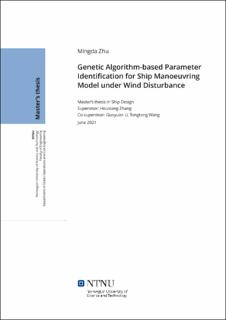Sammendrag
With the rapid development in ship digitalization and automation, to accurately determine the ship mathematical model has become much more demanding. Dynamic ship mathematical model with high fidelity is the indispensable foundation to marine operations and innovations, enabling better operation, control and monitoring. It's an essential task to estimate the hydrodynamic coefficients under the environmental disturbances induced by the wind in order to establish a more realistic ship mathematical model. Parameter identification, as a useful tool, plays an outstanding role in the identification of ship mathematical model in manoeuvring. Identification methods such as the least square method, support vector machine method and genetic algorithm, are all restricted to their imperfection when using individually.
In this master thesis, an evolutionary optimization-based identification framework is proposed to combine the advantage of the identification method and optimization method. The parameter identification is conducted on the 3-DOF Abkowitz model of a Mariner cargo ship using data collected from zigzag simulation to obtain the hydrodynamic coefficients under various wind conditions. To study the effects of wind speed, noise and direction on the accuracy of identification results, three groups of experiments are carried out. Different patterns are summarized with regard to the corresponding effects of wind conditions. Identified hydrodynamic coefficients are verified by benchmark from PMM test and the model performance is further validated by trajectory and velocity comparison. The least square method + genetic algorithm and support vector machine method + genetic algorithm are able to improve the accuracy of some selected hydrodynamic coefficients by utilizing a global sensitivity analysis and they perform more effectively under certain scenarios which are specified in this thesis. However, the overall effectiveness and optimization efficiency of the framework needs to be further improved.

